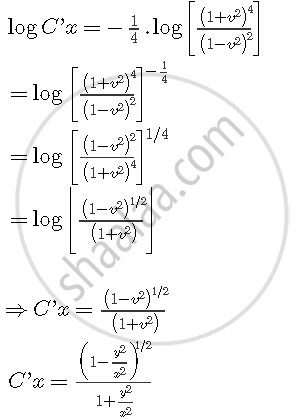Advertisements
Advertisements
Question
Prove that x2 – y2 = c(x2 + y2)2 is the general solution of the differential equation (x3 – 3xy2)dx = (y3 – 3x2y)dy, where C is parameter
Solution
The given equation is:
(x3 – 3xy2)dx = (y3 – 3x2y)dy
`=> (dy)/(dx) = (x^3 - 3xy^2)/(y^3 - 3x^2y)`
which is a homogeneous equation.therefore substituting y=vx




RELATED QUESTIONS
Solve the differential equation :
`y+x dy/dx=x−y dy/dx`
Show that the given differential equation is homogeneous and solve them.
(x2 – y2) dx + 2xy dy = 0
Show that the given differential equation is homogeneous and solve them.
`x dy - y dx = sqrt(x^2 + y^2) dx`
Show that the given differential equation is homogeneous and solve them.
`y dx + x log(y/x)dy - 2x dy = 0`
Show that the given differential equation is homogeneous and solve them.
`(1+e^(x/y))dx + e^(x/y) (1 - x/y)dy = 0`
For the differential equation find a particular solution satisfying the given condition:
(x + y) dy + (x – y) dx = 0; y = 1 when x = 1
For the differential equation find a particular solution satisfying the given condition:
`2xy + y^2 - 2x^2 dy/dx = 0; y = 2` when x = 1
Prove that x2 – y2 = c (x2 + y2)2 is the general solution of differential equation (x3 – 3x y2) dx = (y3 – 3x2y) dy, where c is a parameter.
(x2 + 3xy + y2) dx − x2 dy = 0
Solve the following initial value problem:
\[x e^{y/x} - y + x\frac{dy}{dx} = 0, y\left( e \right) = 0\]
Solve the following initial value problem:
(xy − y2) dx − x2 dy = 0, y(1) = 1
Solve the following initial value problem:
(y4 − 2x3 y) dx + (x4 − 2xy3) dy = 0, y (1) = 1
Solve the following initial value problem:
x (x2 + 3y2) dx + y (y2 + 3x2) dy = 0, y (1) = 1
Solve the following initial value problem:
\[\left\{ x \sin^2 \left( \frac{y}{x} \right) - y \right\}dx + x dy = 0, y\left( 1 \right) = \frac{\pi}{4}\]
Find the particular solution of the differential equation x cos\[\left( \frac{y}{x} \right)\frac{dy}{dx} = y \cos\left( \frac{y}{x} \right) + x\], given that when x = 1, \[y = \frac{\pi}{4}\]
Find the particular solution of the differential equation \[\left( x - y \right)\frac{dy}{dx} = x + 2y\], given that when x = 1, y = 0.
Which of the following is a homogeneous differential equation?
Solve the following differential equation:
y2 dx + (xy + x2)dy = 0
Solve the following differential equation:
x dx + 2y dx = 0, when x = 2, y = 1
State the type of the differential equation for the equation. xdy – ydx = `sqrt(x^2 + y^2) "d"x` and solve it
Which of the following is not a homogeneous function of x and y.
F(x, y) = `(sqrt(x^2 + y^2) + y)/x` is a homogeneous function of degree ______.
F(x, y) = `(ycos(y/x) + x)/(xcos(y/x))` is not a homogeneous function.
Let the solution curve of the differential equation `x (dy)/(dx) - y = sqrt(y^2 + 16x^2)`, y(1) = 3 be y = y(x). Then y(2) is equal to ______.
